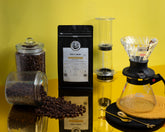When you search at your of your local grocery store or shop online for coffee, you've likely noticed a significant price difference between regular coffee and specialty coffee. Many people wonder why specialty coffee is often much more expensive. Is it really worth the price tag? In this article, we'll dive into the factors that make specialty coffee stand out from regular coffee and why it's more costly. From the way the coffee beans are grown, harvested, processed, and roasted, to the level of care and expertise that goes into every cup, specialty coffee offers an unparalleled experience that justifies its price.
1. High-Quality Coffee Beans
One of the primary reasons why specialty coffee is more expensive than regular coffee is the quality of the beans. Specialty coffee comes from high-quality, carefully selected beans that meet stringent standards. In fact, for a coffee to be considered “specialty,” it must score 80 points or higher on a 100-point scale according to the Specialty Coffee Association (SCA). This grading system evaluates the coffee’s aroma, flavor, acidity, body, and aftertaste. Only the top 5-10% of all coffee produced globally meets these standards.
Regular coffee, on the other hand, typically consists of lower-grade beans, often a blend of different origins. These beans don’t go through the same rigorous selection process, and as a result, they are sold at a much lower price point. Specialty coffee beans are often single-origin, meaning they come from one specific region or farm, which enhances their unique flavor profiles and ensures a consistent, high-quality product.
2. Direct Trade and Ethical Sourcing
Another significant factor that influences the price of specialty coffee is how the beans are sourced. Specialty coffee roasters often engage in direct trade, which means they establish relationships with the farmers who grow the coffee beans. This method ensures that farmers receive a fair price for their labor and efforts, often well above the market rate or the fair-trade minimum.
At Direct Origin Coffee Roasters, we pride ourselves on sourcing coffee beans directly from farmers, ensuring they are compensated fairly. This not only guarantees better wages for the farmers but also encourages sustainable farming practices. In contrast, regular coffee is usually sold in bulk through middlemen or commodity markets, where farmers receive less compensation. This can lead to lower quality and less incentive for farmers to produce superior coffee.
By supporting specialty coffee, you’re not just paying for a better-tasting cup—you’re also contributing to ethical and sustainable farming practices that benefit coffee-growing communities around the world.
3. Labor-Intensive Growing and Harvesting Process
The process of growing and harvesting coffee plays a massive role in determining its price. Specialty coffee is often grown at higher altitudes, in specific climates, and under precise conditions that are ideal for producing premium-quality beans. The coffee plants require meticulous care, including regular pruning, fertilization, and pest control.
Unlike regular coffee, which is often mass-produced on large farms, specialty coffee is frequently grown on smaller farms, where farmers pay close attention to every detail. This hands-on approach results in a better product but also increases labor costs.
Moreover, the harvesting process for specialty coffee is done by hand, ensuring that only the ripest, highest-quality cherries are picked. Hand-picking is labor-intensive and time-consuming, but it ensures that the beans are at their peak of ripeness, which translates to a more flavorful and aromatic cup. In contrast, regular coffee is often harvested mechanically, which can result in overripe or underripe beans being mixed in, affecting the overall quality.
4. Precise Processing Methods
Once the coffee cherries are harvested, they go through various processing methods to extract the beans. Specialty coffee is processed with great care, ensuring that the beans retain their distinct flavors and characteristics. There are several methods for processing coffee, including washed, natural, and honey-processed, and each method requires skill and precision.
For example, the washed method, which is commonly used for specialty coffee, involves removing the cherry pulp from the beans before they are fermented and dried. This method requires a lot of water and labor but results in a cleaner and brighter flavor profile. In contrast, regular coffee is often processed in bulk using less precise methods, which can lead to inconsistencies in flavor and quality.
At Direct Origin Coffee Roasters, we prioritize careful and controlled processing to ensure that every batch of coffee we produce meets the highest standards of quality.
5. Small-Batch Roasting
Roasting plays a crucial role in the flavor of the coffee. Specialty coffee is typically roasted in small batches, allowing roasters to have greater control over the process and tailor the roast profile to bring out the best qualities of the beans. Small-batch roasting requires more time, effort, and expertise, but the result is a superior cup of coffee with more complexity and depth of flavor.
Large-scale commercial coffee production, on the other hand, often involves roasting massive quantities of beans at once. This method is more efficient and cost-effective, but it can result in a less nuanced flavor profile. Additionally, commercial roasters often roast beans to a darker level to mask imperfections in the lower-quality beans, leading to a bitter or burnt taste.
At Direct Origin Coffee Roasters, we take pride in our small-batch roasting techniques, which allow us to highlight the unique flavors of each coffee origin. Whether you prefer a light, medium, or dark roast, you can taste the difference in every cup.
6. Attention to Freshness
Freshness is a key component of specialty coffee. The time between roasting and brewing has a significant impact on the flavor and quality of the coffee. Specialty coffee roasters often roast their beans to order and ship them directly to customers to ensure maximum freshness. This commitment to freshness results in a more vibrant and flavorful cup of coffee.
In contrast, regular coffee is often roasted in bulk and can sit on store shelves for weeks or even months before being purchased. By the time it reaches the consumer, it may have lost much of its original flavor and aroma.
At Direct Origin Coffee Roasters, we believe in delivering freshly roasted coffee straight to your door, ensuring that every cup you brew is as fresh and flavorful as possible.
7. Unique Flavor Profiles
One of the most compelling reasons to choose specialty coffee over regular coffee is the unique flavor profiles that specialty beans offer. Because specialty coffee is often single-origin, you can experience distinct flavors from different regions around the world. For example, coffee from Ethiopia may have fruity and floral notes, while coffee from Colombia may have a rich, chocolatey flavor.
Regular coffee, on the other hand, is often a blend of beans from various regions, which can result in a more generic taste. Additionally, because regular coffee beans are typically roasted to a darker level, many of the nuanced flavors are lost, resulting in a more one-dimensional flavor profile.
At Direct Origin Coffee Roasters, we offer a wide range of specialty coffees, each with its own unique flavor characteristics. Whether you're looking for a bright, citrusy coffee or a smooth, nutty brew, you'll find something to suit your taste.
Conclusion
Specialty coffee is more expensive than regular coffee for several reasons, including the quality of the beans, ethical sourcing practices, labor-intensive growing and harvesting, precise processing methods, small-batch roasting, and a commitment to freshness. When you choose specialty coffee from Direct Origin Coffee Roasters, you're not just paying for a cup of coffee—you're investing in a superior product that delivers an exceptional taste experience while supporting ethical and sustainable practices. Visit directorigincoffee.com to explore our selection of specialty coffees and taste the difference for yourself.










